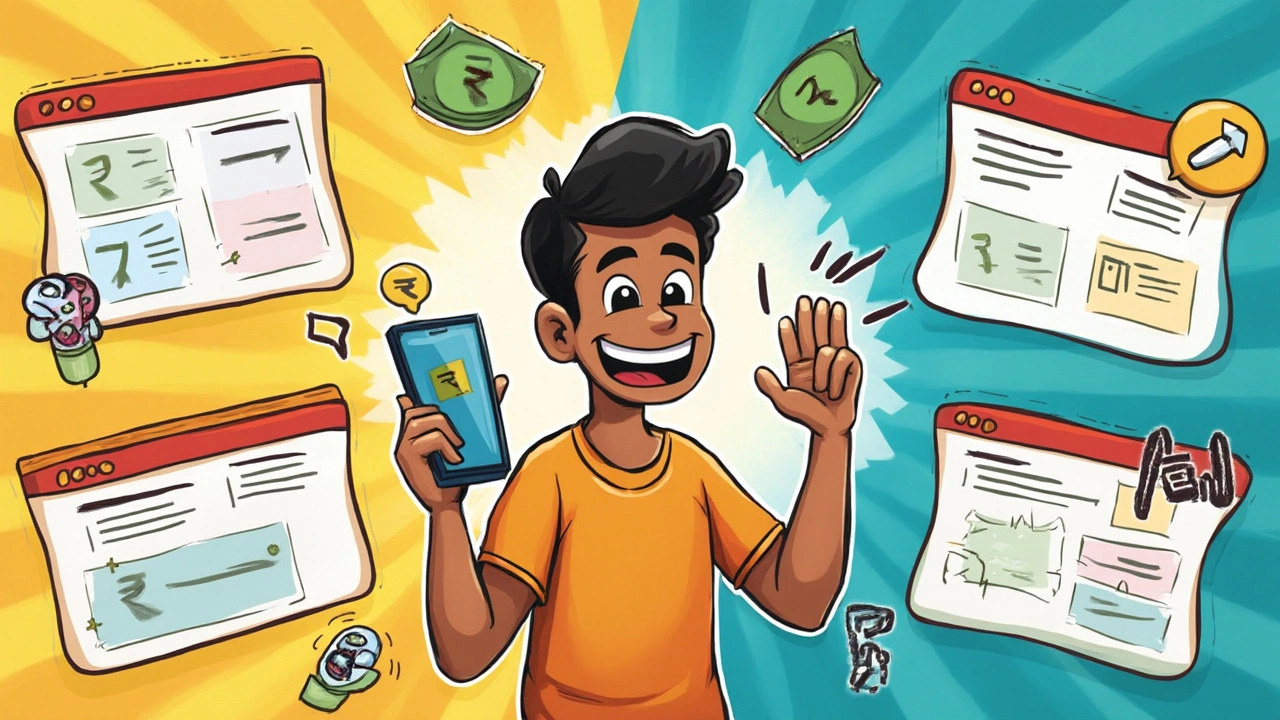If you're new to coding, you might wonder if there's any real way to turn your fresh skills into money. Honestly, yes—people do it every day, even if they're still working on their first big project. The key is knowing where to look and what kind of work matches your current level. Not every gig will require you to build the next Facebook. Sometimes, businesses just need help updating their website, fixing a spreadsheet script, or setting up an email form.
You don't need a computer science degree or a shelf full of trophies to start earning. Some folks get paid to write simple automations—even something as basic as a dog feeding schedule app for their pet. weird side note: I built one for my own dog, Rufus, and that simple project got me a few similar gigs from neighbors. People and small businesses often want quick, affordable help. You just have to reach them.
- Is It Possible to Earn as a Beginner?
- Easy Ways to Land First Paid Coding Jobs
- How Much Can a Newbie Actually Make?
- Common Pitfalls to Avoid When Starting Out
- Proven Tips for Building Skills and Cash Flow
Is It Possible to Earn as a Beginner?
Plenty of folks think you need years of experience to get paid writing code. That’s not true anymore. With the rise of freelancing, remote work, and thousands of small businesses that just want simple tech fixes, there are gigs popping up every day for beginner coders.
For example, Upwork’s 2024 report showed that about one-third of new freelancers in their Web & Software Development category listed less than a year of coding experience. These people were landing gigs like updating basic web pages, automating tasks in Excel with Python, or writing quick scripts to scrape public data. Even paid internships, many now remote, often hire folks who can show basic projects or just completed a coding boot camp.
Don’t expect huge paychecks at the start. Most beginner projects pay between $10–$25 an hour (sometimes it’s a flat $30 to fix a site, or $50 for a single automation). Still, that’s real money coming in, often while you’re still taking online coding classes at night or on weekends.
Here’s the deal: Businesses and solo entrepreneurs are desperate for help with simple tech stuff—think fixing email forms, making tiny changes to a WordPress site, or writing small automation scripts. If your skills let you do basic things reliably, you can turn that into cash way sooner than you think.
Your first paying clients might be local businesses, friends, or complete strangers on the internet. Don’t worry about being perfect. Clients would much rather pay a reliable beginner to fix something soon, than wait weeks for an "expert" to get around to it.
Easy Ways to Land First Paid Coding Jobs
When you're just starting out, you don't have to chase huge companies or big-name startups. Focus on gigs that actually match your experience. The low-hanging fruit is everywhere—you just need to know where to look.
- Freelancing Platforms: Websites like Upwork, Fiverr, and Freelancer have loads of simple projects meant for beginners. People post tasks like fixing a website button, making simple forms, or building tiny apps. If your portfolio is weak, do a couple of sample projects (even if they’re for your own use) and list them. That way, you don’t sound like you’re working from scratch.
- Job Boards for Micro-Tasks: GitHub’s "Good First Issue" label marks beginner-friendly coding tasks in open-source projects. While these are normally unpaid, they can double as your calling card for freelance work. Also, look at remote job boards like We Work Remotely or RemoteOK—there are sometimes entry-level coding gigs.
- Local Businesses: Walk around your city or town. Many restaurants, shops, and gyms still don't have great websites or useful automations—sometimes they need something as simple as a new contact form. Offer them affordable help. Bring a basic site or script you’ve made, even if it’s a demo, so you have something concrete to show.
- Facebook Groups and Community Boards: Seriously, these are goldmines. Search for "small business owners" or "startup help" groups. Folks often post looking for someone to fix small tech problems or make tiny custom solutions.
- Ask People You Know: It sounds cliché, but your friends, classmates, or even that neighbor with a dog-walking business might need a quick fix. If you’ve built anything useful or fun (like a pet timer app), show it off and just ask, "Hey, need anything like this?"
The truth: most paying gigs for beginner coders aren't glamorous, but they pay real money and help you sharpen your skills for bigger jobs later. Even micro-tasks add up—and sometimes lead to long-term gigs or helpful referrals.

How Much Can a Newbie Actually Make?
You might assume beginner coders can’t pull in real cash, but the numbers tell another story. In 2024, surveys from Upwork showed that people just starting out with Python, HTML, or basic web tasks often landed jobs between $10 and $25 an hour. Some gigs—like fixing a WordPress bug or writing a script to clean up spreadsheets—pay per project, usually $30 to $150 for small tasks.
There’s a huge range, though. Tasks on platforms like Fiverr or PeoplePerHour can go as low as $5, but if you’re patient and pick up a handful of repeat clients, you can hit $500 or more a month as a beginner—with just evenings and weekends. I know one guy who literally started out setting up email forms for local shops for $40 a pop. He did five in a week, while still learning on YouTube.
"For those just starting, your rates will be lower, but the real value is in building a portfolio and reviews. Most clients are happy to pay more once you prove you can deliver." — Sarah Chmiel, freelance developer and coding coach, interview with CodeNewbie Podcast, February 2024
It’s true, you probably won’t make six figures as a total newbie, but even a few paid gigs are a win when you’re still learning. Here’s what determines how much you’ll take home:
- Which coding languages and tools you use (JavaScript, Python, and WordPress are in big demand)
- How quickly you finish jobs and respond to messages
- Your ability to explain what you can (and can’t) do in plain English
- Your reviews and sample projects for your beginner coders profile
If you’re hoping to boost your earnings, take on simple but real-world projects. Even a basic online calculator or a store locator map can look great in your portfolio and help you charge a little more next time.
Common Pitfalls to Avoid When Starting Out
When beginner coders set out to make money, it’s surprisingly easy to trip up. Small mistakes can waste loads of time or even cost you money. Here’s what usually goes wrong and how you can steer clear from the get-go.
- beginner coders often undercharge. You may think your skills are too basic, but charging rock-bottom rates is a fast way to burn out and attract clients who don’t respect your time. Quick tip: look up what others with your skill set are charging, even if it’s just small gigs on sites like Upwork or Fiverr.
- Another trap is saying yes to everything. Taking jobs that are way over your head sounds bold, but it usually ends with frustration and unhappy clients. Stick to work you feel at least 80% confident about.
- Ignoring contracts or written agreements. Don’t skip this step, even for basic jobs! Write down what's expected, deadlines, and payment terms. Verbal deals can go sideways fast.
- Jumping into too many programming languages. You don’t need to know Python, JavaScript, and Perl all at once to earn your first dollars. Pick one and focus. That’s how you actually get hirable.
- Not asking for feedback. After a job, a short message like, “Did everything work as you expected?” helps you improve and builds rapport for the future.
Here’s a quick table with real numbers from an online freelance survey (2024, Twine):
| Pitfall | % of Beginners Affected |
|---|---|
| Undercharging | 52% |
| Taking on Overly Complex Jobs | 34% |
| No Written Agreements | 45% |
| Trying Too Many Languages | 29% |
| Not Asking for Feedback | 41% |
Dodge these common mistakes and you’ll have a much smoother (and profitable) ride starting out. Every coder runs into bumps, but there’s no reason you have to make the usual ones.

Proven Tips for Building Skills and Cash Flow
Want to go from learning basics to actually getting paid? Here’s how beginner coders can speed up their progress—and their income. I’m talking practical steps, not just vague motivation.
- Practice by Solving Real Problems: The fastest way to get better is to use your skills on actual needs. Check out forums like Reddit’s r/forhire, odd jobs on Upwork, or neighborhood Facebook groups for people needing small coding help. Fixing a family friend’s website or setting up an email list? That counts.
- Join Coding Groups or Co-working Calls: Being part of a community, even just virtually, puts you in touch with folks swapping tips and sometimes sharing paid gigs. Discord servers and Slack groups for beginners often have job channels.
- Don’t Be Afraid to Charge (Even If It’s Low): If someone asks you for a script or a tweak, say yes and put a price on it. Plenty of coders got started by doing $25 or $50 jobs for local businesses or family.
- Document Your Work: Make a simple portfolio on GitHub or a free site like Carrd. Keep it basic but professional—real examples beat fancy graphics.
- Take On Microjobs: Sites like Fiverr and TaskRabbit have people offering to pay for quick fixes, like converting Excel sheets to Google Sheets or customizing WordPress pages.
If you want to see how these options stack up, check out this comparison table with some real 2025 rates and platforms:
| Platform/Method | Typical Newbie Pay | Skill Level Needed | Time to First Gig |
|---|---|---|---|
| Fiverr | $25-100 per task | Basic scripts, web edits | 2-7 days |
| Upwork | $50-200 per project | Entry-level coding | 1-3 weeks |
| Reddit r/forhire | $20-75 per gig | Simple automations | 1 day-1 week |
| Local Businesses | $50-300 per fix | Website tweaks | Varies |
Don’t undervalue yourself just because you’re starting out as one of the beginner coders. Businesses know a quick spreadsheet script or landing page update saves them tons of time. As you finish these mini-gigs, you’ll get more confident and start charging more. Even 1-2 paid jobs a month can mean an extra $100 to $400 in your pocket, and that’s before you’ve even finished your first coding course.
Bottom line? Say yes to small projects, share your wins, and keep those skills sharp. Every gig, no matter how tiny, is a step closer to making real money while you learn.
